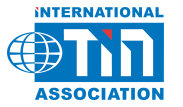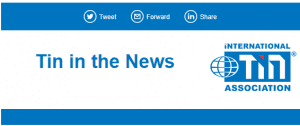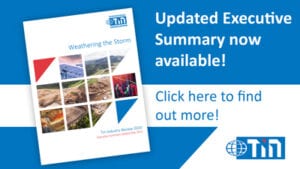A new survey carried out by Bloomberg suggests that Indonesian tin exports could fall to around 61,000 tonnes this year due to tighter controls on mining operations. This is a drop of some 20% compared to a preliminary trade ministry estimate of 2014 exports of 75,925 tonnes. In addition an initiative aimed at protecting the fishing industry could adversely affect offshore mining activity.
Bloomberg polled nine producers and analysts, including Indonesia’s two largest tin producers. Agung Nugroho, corporate secretary at PT Timah, Indonesia’s biggest producer, expects exports of 60,000 tonnes, while Petrus Tjandra, chief executive of PT Refined Bangka Tin, the largest private smelter, estimates 61,000 tonnes.
A planned clampdown on mines in 2015, to check which are so-called clean-and-clear and not in breach of regulations, will further erode supplies, according to the Association of Indonesia Tin Exporters. “We’re under a lot of pressure,” said Jabin Sufianto, chairman of the association, told Bloomberg. “The Energy and Mineral Resources Ministry ordered the governor and regents to start reviewing mining operations from February. This could reduce ore supply as the number of clean-and-clear tin mines is very small.” Clean-and-clear mines operate with the correct licenses, their mining area doesn’t overlap with other claims and they pay royalties regularly. While the initiative was introduced by Indonesia’s last government led by Susilo Bambang Yudhoyono, and was mostly used to assess coal mines, it has been retained by his successor, Joko Widodo, as he seeks to revamp the economy.
Meanwhile, a proposal by the Maritime and Fishery Minister Susi Pudjiastuti to halt offshore mines may also cut supply, M.B Gunawan, president director of smelter PT Stanindo Inti Perkasa told Tempo.com. Pudjiastuti sent a letter to the Bangka Belitung governor in December, seeking to halt mining on the seabed, while drafting zones for fishery and mining. Governor Rustam Effendi announced his own initiative to halt tin exports in response to low prices in November, but has so far been unable to make any progress with this.
ITRI View: The recent history (since 2006) of attempts to control small-scale illegal tin mining in Indonesia has mainly involved regulation of exports by the trade ministry, with sporadic support by police, navy and customs. If the energy and mineral resources ministry has now become more seriously involved in monitoring mining activity, and if it is backed up by the local authorities in Bangka-Belitung, this could be a major step forward. However these are two big “ifs” and for the moment the market is likely to be quite sceptical about such a radical change coming about.


